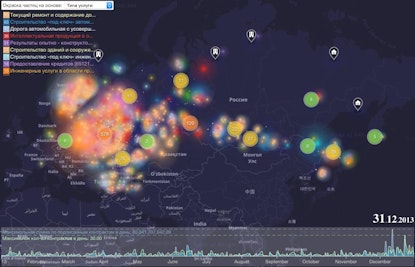From transparency to using the data: analyzing contracts in Russia

By Anna Sakoyan, Data Journalist at NP Informational Culture and Writer for Polit.ru
A government’s contracting process has a huge impact on society, as it deals with all sorts of goods and services that the state provides to citizens. The less transparent and appropriate the process, the more likely it is that taxpayers are paying over the odds and receiving lower quality services. It is for this reason that the Clearspending project – whose ultimate goal is to ‘improve living standards for Russian citizens’ – was born. Clearspending helps navigate and make sense of Russia’s grants, federal and municipal contracts so that citizens can better analyze these and hold their government to account.
Back in 2005, the Russian government quite suddenly set itself rather high standards in public spending transparency. The government passed an act requiring that all public agencies openly publish their data on federal and municipal spending, particularly with regards to tenders and procurements. Several years later, another law was introduced that required even more detailed public accountability, including the disclosure of contracts, transactions within the contracts, as well as other relevant official documents.
All in all, more than fourteen million documents regarding contracts have been published at the time of writing. They are available at the official public procurements portal Zakupki.gov.ru. But while this is a huge open database, the portal is not particularly easy to use or navigate. Its search tool is for instance deplorably weak: you can search by keywords and ‘customers’ (the government body, i.e a municipality, procuring the goods/services), but you cannot look for particular suppliers and their contracting record, which could be very instructive. Searching the whole database can be very slow. Last, but not least, due to its complexity the portal needs regular maintenance and is therefore often completely unavailable.
Despite these shortcomings, the portal is a great source of data. What is missing is a tool that can make it more usable for a broader audience. This is where the Clearspending project comes in. The objective of the Clearspending project was to create an easy-to-use tool for a broad audience to search through public contracts, find details of public spending and get information on suppliers and their public customers.
Clearspending, (GosZatraty in Russian) is an independent technological platform, developed by NGO Information Culture in partnership with the Civil Initiatives Committee. It officially launched in April 2014.
Clearspending has its own database, which is a regularly updated copy of the official public procurements database and all its digital data. However, it is much faster than the official portal as it provides links to original documents rather than containing the scanned documents themselves. Unlike the government site, which sometimes has to be closed for maintenance, the Clearspending platform is always available. It has a more sophisticated and more user-friendly search engine that allows searching by keywords, suppliers and customers depending on a user’s needs. It has a sectionwith contracts flagged as potentially problematic, whether that be contracts suspected of public spending inefficiency (involving the procurement of luxury goods) or contracts containing distorted information. Clearspending also shares its API, making it possible for developers to use the data in their apps and several apps have already been created. For instance, this app shows the expenditure of particular government bodies on products/services in a given year. It also provides details for each area of expenditure. The interactive visualization shows the distribution of government spending geographically and over time. It also shows on a map where money comes from and where it goes. The app uses a sample of the contracting data, which only includes contracts signed in 2013 and above 500 million roubles.
As a result, Clearspending has already become a regularly visited resource, particularly by citizen activists looking to find background information on the activity of local institutions or companies. Many of them encounter Clearspending while googling for a record of a particular organization. Today, Clearspending has an audience of roughly five thousand unique visits per day.
Still, there remains a lot yet to be done. Our priority now is to attract the attention of the media. At the moment, awareness among journalists of the availability of open data is rather low. In this respect, our ambition is to make Clearspending a key tool for journalists to use in their research and as a source for news stories. We are currently employing several strategies to promote the resource. This includes publishing infographics and data reviews on particular topics, from procurement of medicine to government contracting with higher education institutions. We are also developing open educational initiatives and currently working on creating a School of Information Culture.
Our even more ambitious goal in the future is to engage with as many interested people, particularly academics, as possible in the research of such areas as corruption, the structure of the Russian economy, average prices and public finance distribution. Technically, all these areas of research can benefit from the thorough study of contracting data.
Ultimately, we hope that our project can contribute to building a stronger and more transparent connection between businesses, citizens, and public authorities.
That is why we also consider the application of international standards, such as Open Spending and the Open Contracting Data Standard, which could make data collection and processing more structured, and therefore more usable. It is unknown whether the government will soon adopt new practices. For our part, we are definitely willing to apply the best practices of international initiatives to Clearspending, both for better international integration and in search of new ideas that we can implement in Russia. We hope that through our project, Russia’s steps towards transparency will yield genuine accountability and improve the lives of our citizens.